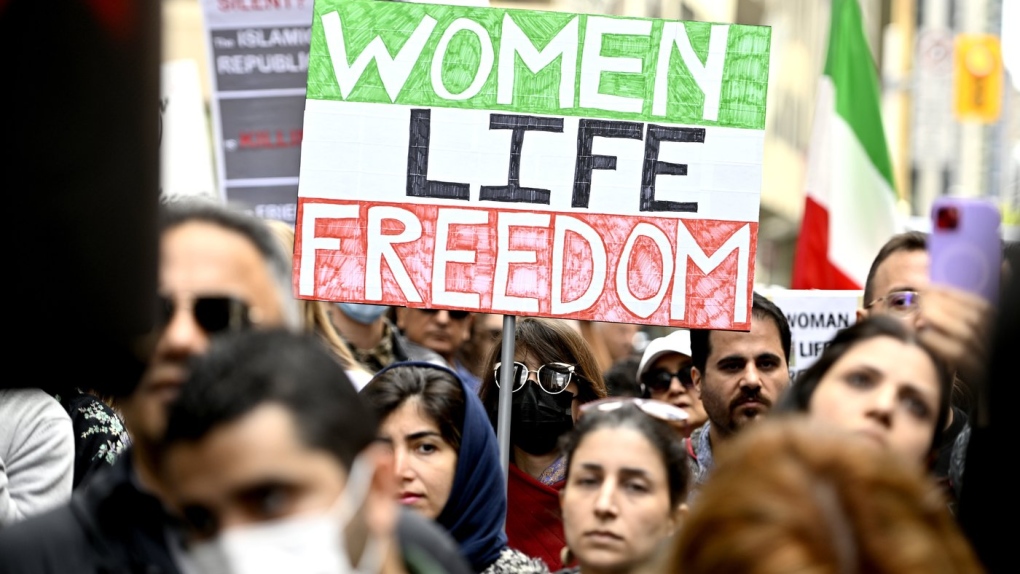Montreal-led alliance of investors mobilizes for human rights in Iran
 Members of the Iranian community and their supporters rally in solidarity with protesters in Iran, after 22-year-old Mahsa Amini died in police custody for allegedly improperly wearing a hijab, in Ottawa on Sunday, Sept. 25, 2022. THE CANADIAN PRESS/Justin Tang
Members of the Iranian community and their supporters rally in solidarity with protesters in Iran, after 22-year-old Mahsa Amini died in police custody for allegedly improperly wearing a hijab, in Ottawa on Sunday, Sept. 25, 2022. THE CANADIAN PRESS/Justin Tang
Montrealers are at the helm of an international alliance of 131 investors who are calling on the business community, and more specifically on companies in the information and communications technology (ICT) sector, to assume their responsibility to respect human rights in their dealings with Iran, which is still in the grip of a wave of protests following the tragic death of Mahsa Amini.
Mahsa Amini was a 22-year-old Iranian student who died under murky circumstances last September, three days after being arrested by Iranian morality police for not dressing modestly enough. Amini's death caused an uproar in Iran and waves of mass protests created a movement across the country calling for a change in the current political regime.
In a statement, the investor group, which manages more than US$352 billion in assets worldwide, calls on its peers and business partners to adhere to the UN Guiding Principles on Business and Human Rights, which state that all companies have a responsibility "to avoid causing or contributing to adverse human rights impacts through their own operations, and to rectify such impacts when they occur."
"For us, it is a way to call for more diligence so that investors ensure that the companies they support are not complicit in what is happening in Iran," says Sherazad Adib, a Montrealer of Iranian origin who, with François Meloche, is at the origin of the group.
'DIGITAL AUTHORITARIANISM'
Currently, the Iranian government restricts internet access to its citizens, violates their privacy by spying on their electronic devices, hacks dissident websites and uses facial recognition and other artificial intelligence tools to track and identify its opponents.
"This is a barbaric government that uses modern technology to carry out its repression," Adib said.
In this sense, the ICT sector can play a crucial role in the protests against the Iranian regime because it provides products and services essential to freedom of expression, access to information and freedom of association, and therefore to the promotion of human rights, said Meloche.
The partner and director of engagement at Aequo does not hesitate to use the term "digital authoritarianism" to describe Iran's attitude towards its citizens whose fundamental rights are violated.
"This approach is part of the responsible investment movement, where we realize that being a shareholder or lender implies responsibilities towards society," he noted.
The declaration will be posted online on Thursday and can be signed by investors and citizens who support the cause.
- This report by The Canadian Press was first published in French on April 20, 2023 and was written with the financial support of the Meta Exchange and The Canadian Press for news.
CTVNews.ca Top Stories

Canada crashes out of world juniors in quarterfinals for second straight year
Canada has been eliminated from the world junior hockey championship with a 4-3 loss to Czechia in the quarterfinals.
Pickering pausing in-person meeting due to alt-right threats, mayor says
Pickering Mayor Kevin Ashe says the city is pausing all in-person meetings, moving them to a virtual format, for the time being due to “alt-right” threats.
Athabasca 'chop shop' bust yields millions in stolen vehicles, heavy equipment: RCMP
RCMP have made what they call a "major recovery" of stolen property in Athabasca.
2 dead and 18 injured in Southern California plane crash
Two people died and 18 were injured Thursday when a small plane crashed through the roof of a sprawling furniture manufacturing building in Southern California where at least 200 people were working, police said.
Toys "R" Us Canada closing 5 stores, expand HMV and add play spaces to some shops
Toys 'R' Us Canada says it is closing five Ontario stores and revamping several others as it works to 'optimize' its business.
Wayne Osmond, singer and guitarist for The Osmonds, is dead at 73
Wayne Osmond, a singer, guitarist and founding member of the million-selling family act The Osmonds, who were known for such 1970s teen hits as 'One Bad Apple,' 'Yo-Yo' and 'Down By the Lazy River,' has died. He was 73.
Grieving orca mother Tahlequah carries dead baby for the second time
The famous mother orca who made waves around the world for carrying her dead calf for 17 days has suffered another tragic loss.
Former Liberal cabinet minister Marco Mendicino won't seek re-election
Marco Mendicino, a prominent Toronto member of Parliament and former minister of public safety and immigration, won't run in the next federal election, CTV News has learned.
U.S. soldier shot self in head before Cybertruck exploded outside Trump's Las Vegas hotel, officials say
The highly decorated U.S. army soldier inside a Tesla Cybertruck packed with fireworks that exploded outside Trump International Hotel in Las Vegas shot himself in the head just before detonation, authorities said Thursday.


































